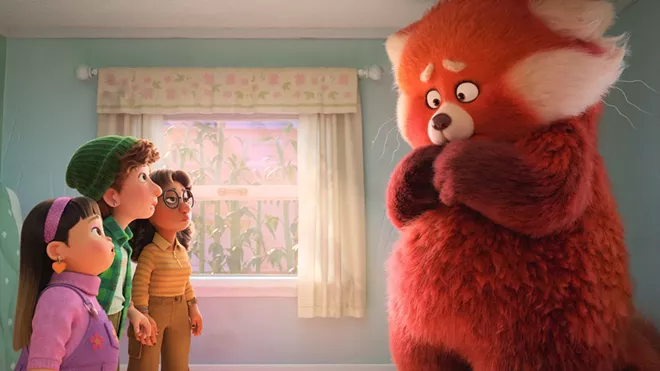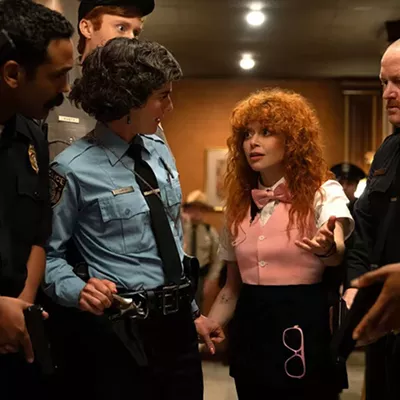Adolescence is tough enough without turning into a hideous monster, and movies from Teen Wolf to Ginger Snaps have gotten plenty of mileage out of conflating those two experiences. Pixar's delightful Turning Red fits firmly into that genre, in its own cute, family-friendly way. Thirteen-year-old Meilin Lee (voiced by Rosalie Chiang) doesn't turn into a werewolf as she enters puberty, but she comes close. Thanks to an ancient family legacy, her journey into womanhood is accompanied by the unfortunate side effect of transforming into a giant red panda whenever she experiences heightened emotion.
In that way, she's more like the Hulk than a werewolf, and her transformations can be similarly destructive. To Mei, the legacy feels more like a curse, especially since she knows nothing about it when she wakes up one day as a huge fluffy panda, like Gregor Samsa discovering he's become a cockroach. She manages to turn back into her regular self before heading to school, but it doesn't take much to bring the panda back out. After a rampage through the city, she makes her way home, where her mother, Ming (Sandra Oh), finally gives her the backstory on her animalistic inheritance.
Hundreds of years ago, Mei's ancestor called on the spirit of the red panda to defend her family from danger, and now the women in Mei's family all come into their own panda power as they mature. There's a ritual that must be performed to trap the panda spirit in an amulet, and until then all Mei has to do is remain calm and hidden away. That's easier said than done for a 13-year-old girl who can't go a single day without seeing her three best friends or swooning over her favorite boy band, 4*Town.
Set in Toronto in 2002, Turning Red embraces both sides of Mei's Chinese-Canadian identity, rooted in director and co-writer Domee Shi's own background. Shi previously made the Oscar-winning 2018 Pixar short Bao, and Turning Red feels equally personal, a story about navigating cultural expectations while finding your own individuality. Mei's parents put plenty of academic pressure on her, but they aren't mean or inconsiderate. Her diverse group of friends are sometimes baffled by Mei's family obligations, but they're always understanding and encouraging. Mei's story isn't about rejecting either tradition or assimilation, but about taking the best parts of both to end up with a unique whole.
It's also about a massive, cuddly, furry panda doing ridiculous, adorable things, and Turning Red often exhibits the energy of a Looney Tunes cartoon, rather than the more measured humor of Pixar's last few efforts. Mei and her friends are all hyperactive teenagers, and their enthusiasm for both the red panda and 4*Town is infectious. Turning Red is sensitive and insightful about identity and maturity, but it's also a ton of fun to watch, suffused with '00s nostalgia thanks to the absurdity of 4*Town (whose catchy songs are written by the sibling team of Finneas O'Connell and Billie Eilish).
This is a Pixar movie, so of course the animation looks stunning, from the fibers of the red panda's fur to the densely packed Toronto urban landscape. Shi brings in visual influences from Tex Avery to shojo anime, while making the movie fully her own distinctive vision. When Mei's classmates find out about her alter ego, they turn her into a sort of school celebrity, and it's easy to see why she's in such high demand. Mei may be awkward and uncomfortable at times, but she never backs down from who she is, and she's always a blast to be around, panda or not. That's its own special superpower. ♦























